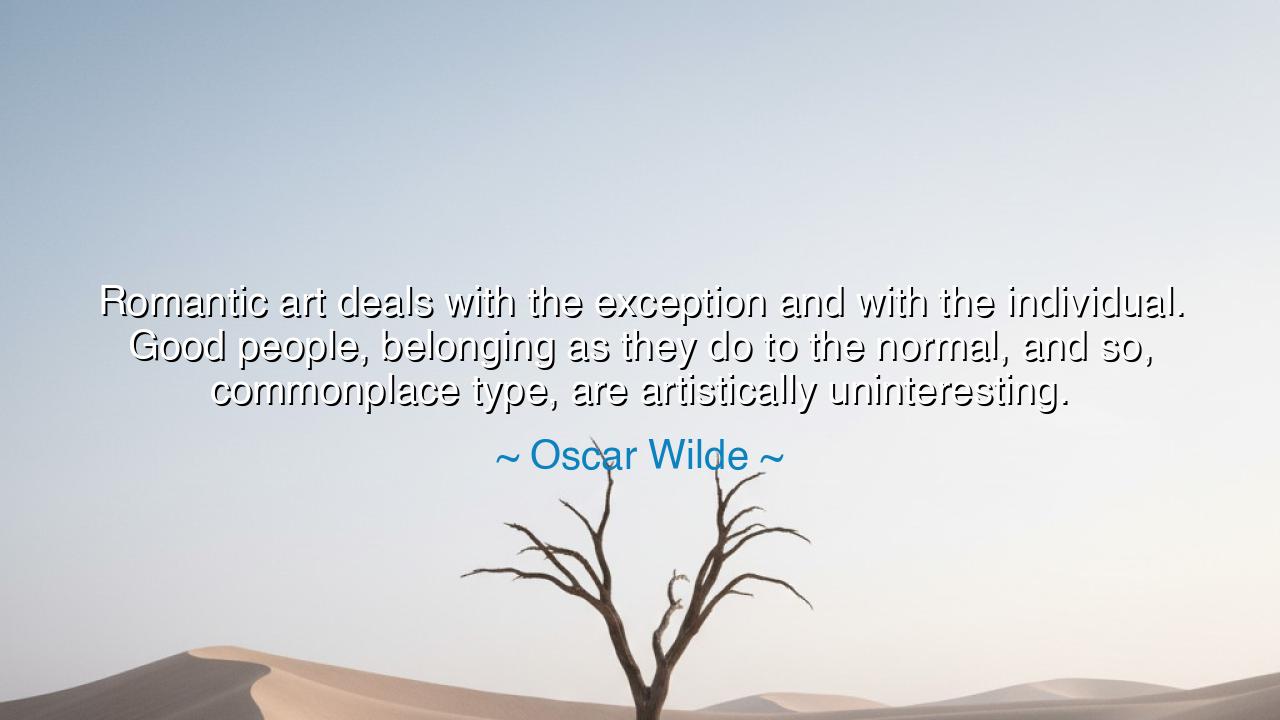
Romantic art deals with the exception and with the individual.
Romantic art deals with the exception and with the individual. Good people, belonging as they do to the normal, and so, commonplace type, are artistically uninteresting.






Hear the piercing words of Oscar Wilde, the master of paradox and beauty: “Romantic art deals with the exception and with the individual. Good people, belonging as they do to the normal, and so, commonplace type, are artistically uninteresting.” These words, dazzling with his wit, reveal a deep truth about art and the human soul. For Wilde reminds us that art does not live in the ordinary, in the predictable, in the smooth surface of convention. Art lives in the crack, in the storm, in the dangerous flame of the exceptional.
The Romantic movement, born in the late eighteenth and nineteenth centuries, rose as a rebellion against order, symmetry, and reason. Where the classical prized harmony, the romantic exalted passion. Where the rationalists sought universals, the Romantics sought the individual, the singular voice, the storm-tossed soul. In this spirit, Wilde proclaims that art cannot find nourishment in the “good,” if by good we mean merely obedient, ordinary, and safe. Art thrives on those who break the mold, whose very existence is an exception.
Consider the great figures of Romantic art and literature: Byron, who scandalized his age with his loves and wanderings; Beethoven, who poured his anguish and defiance into symphonies that shook the heavens; Delacroix, whose canvases blazed with revolution and fire. Were these men “good” in the polite, conventional sense? No. They were unruly, passionate, often broken, yet it was precisely in their exceptionality that their genius shone. Wilde knew this well—for he himself lived as one of these exceptions, both celebrated and condemned, both dazzling and destroyed.
This paradox of the “uninteresting good” is not meant to despise goodness, but to recognize its limits in art. A good person may live a worthy life, serving others quietly, adhering to convention. Such lives sustain the fabric of society, but they rarely ignite the imagination. Drama, poetry, painting—these demand conflict, struggle, extremity. As Wilde declares, art hungers for the singular, for the tortured heart, for the rebel, the visionary, the dreamer who will not fit within the safe walls of the commonplace.
History gives us an eternal example in Joan of Arc. She was not ordinary, not “good” in the sense of being meek or content. She was exceptional, burning with visions, leading armies at the age of seventeen. Her life was a storm, ending in fire at the stake. To society, she was dangerous; to art, she is eternal. Plays, paintings, films, and poems immortalize her—not because she was common, but because she was exceptional, a soul ablaze with conviction. Wilde’s insight lives in her story: art turns not to the safe, but to the extraordinary.
The deeper meaning is this: do not confuse artistic worth with moral simplicity. The artist must look not for what is common, but for what is rare. They must dare to dwell with the broken, the passionate, the troubled, and the visionary. For it is there, in the lives of the exceptions, that the human spirit reveals its greatest heights and its darkest depths. The ordinary sustains life, but the exceptional inspires it.
Therefore, children of tomorrow, hear this teaching: if you would create art, do not fear the wild, the unruly, the individual who stands apart. Do not shun the one who is too much—too passionate, too wounded, too strange—for it is often in such souls that truth is unveiled. And if you yourself are such an exception, do not despair at your difference. Know that your very strangeness may one day become the seed of creation.
Thus Wilde’s words shine across the ages: romantic art does not dwell in the safe gardens of the ordinary, but in the storm-lashed cliffs of the exceptional. The world may praise the good as useful, but art remembers the singular, the passionate, the defiant. And it is through them that humanity touches eternity.






AAdministratorAdministrator
Welcome, honored guests. Please leave a comment, we will respond soon